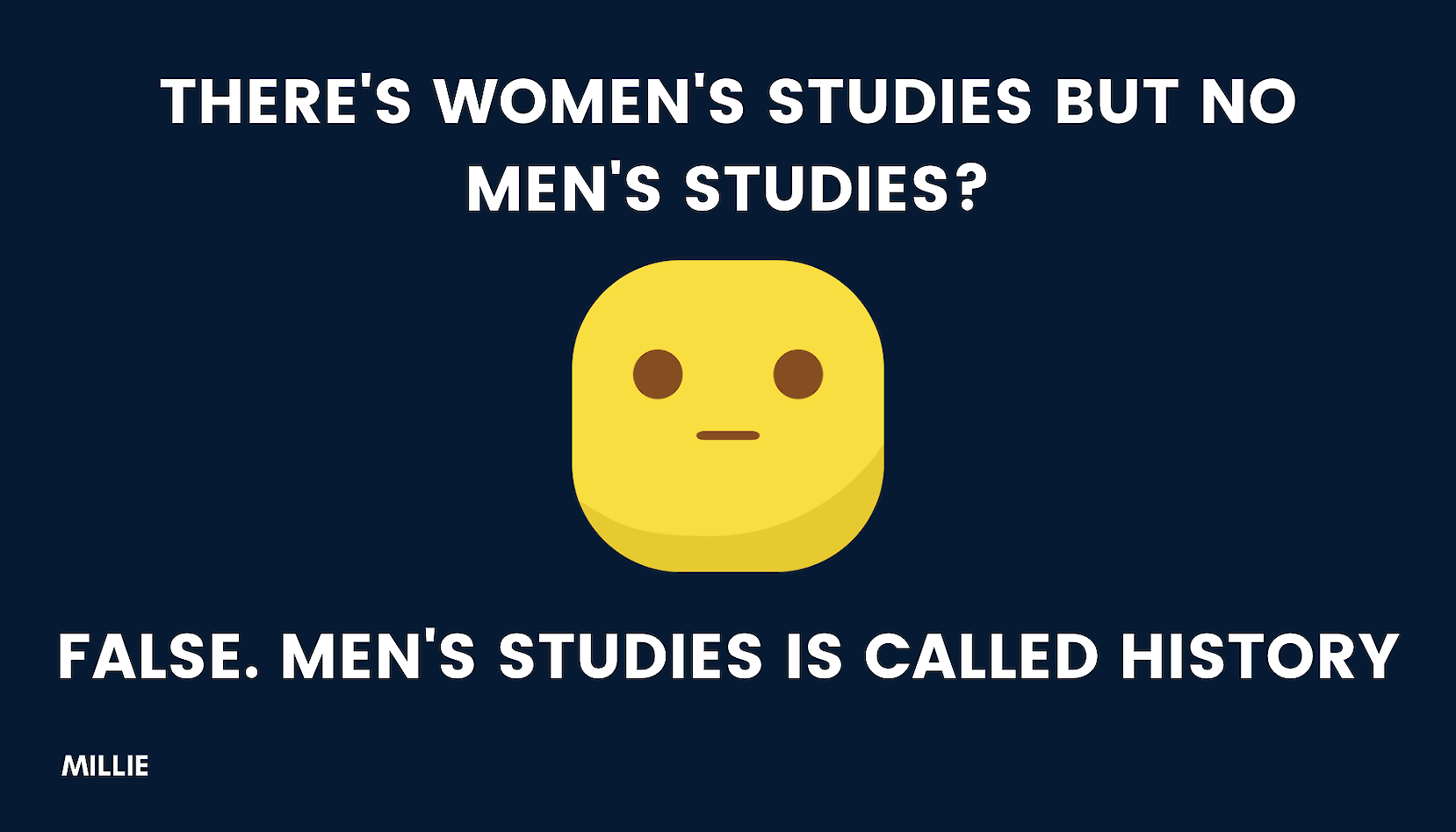Millie’s Guide to Gender and Women’s Studies
Article written by Scarlet Kim based on Millie’s Guide to Gender and Women’s Studies.
Are you interested in exploring the lives of women and the associated issues in today’s society and the past?
Millie spoke to four experts in Millie’s Guide to Gender and Women’s Studies panel.
Meet our panelists:
- Mitula Shanwal: Psychology, Media Studies, and Women’s and Gender Studies at University of Toronto Scarborough (‘19), Account Lead at Pinch Social
- Cara Claire Chang: JD at Santa Clara University School of Law (‘23), Summer Associate at Fragomen
- Léma Andrews-Hirano: Gender, Media, and Culture (MSc) at London School of Economics and Political Science (‘18), Executive Assistant to Chief Executive Officer at Holmusk
- Minushi Gomes: Women and Gender Studies (BA) at University of Toronto Scarborough (‘16), Community Navigator at Access Alliance Multicultural Health and Community Services
What is gender and women’s studies?
Through studying gender and women’s studies, students learn ideologies, theories, and history, which are not only about feminism, but also about race, ethnicity, and society. It is designed to teach how the world operates and how people function within the “grand scheme of society and culture,” as Léma described.
Overall, gender and women’s studies allows students to develop critical thinking skills and grow a new perspective; they can also realize how ideas or concepts that had been taken for granted were also social constructs that need to be thought through carefully.
“Gender and women’s studies students learn ideologies, theories and, history, which are not only about feminism, but also about race, ethnicity, and society.”
What can you learn through studying gender and women’s studies?
The biggest takeaway of studying gender and women’s studies, as our panelists agree, is critical thinking skills. Students are repeatedly reminded to recognize the institutionalized stereotypes prevailing in society; this becomes transferable skills for students, which can be applied in areas like media, business, international relations, or politics.
Gender and women’s studies also equip students with diverse perspectives. Students can become more aware of the power dynamics underlying society and deal with their surroundings more wisely. This also leads to an extremely high degree of realization of oneself, which helps in making better choices in everyday life and unprecedented situations.
“Gender and women’s studies equips students with critical thinking skills and diverse perspectives.”
Can I get a job with a gender and women’s studies degree?
In short, of course!
Our panelists have amazing, established careers, and they all agree that their degrees in gender and women’s studies have played a role in their journeys.
For Mitula, who’s working as a marketing manager, studying gender and women’s studies has let her be conscious of the inclusivity of the message she puts out to the world. Léma told us that the skills she learned by taking a master’s in gender and women’s studies were directly relevant to her position as the executive assistant. Minushi, a community navigator, learned to understand diverse circumstances better based on the diverse viewpoints she acquired during her study, and Cara is actively working on gender-related legal cases owing to her skills and knowledge.
Gender and women’s studies is a degree that allows you to dream in infinite ways; there are no ‘typical’ careers that the graduates choose, as they have designed their unique pathways, utilizing the skill sets they’ve earned through their degrees.
Additionally, studying gender and women’s studies can ‘give an edge’ to your resume, as this is a relatively new field. Make sure you can explain the relevant connections between this unique course and the job you want to get - this will definitely be a game changer!
“Gender and women’s studies degree allows students to design their unique pathways and can give an edge to their resumes.”
Are there scholarships available?
If you are already in university, the first and foremost thing to do is to look at the university’s scholarship website. Although it is rare for universities to have scholarships specific to gender and women’s studies, there will surely be ones that you qualify for (e.g., open to all majors, humanities, female, home/international status, etc.) Make sure to take your time and do thorough research, as new scholarships can get updated anytime.
If you are an aspiring gender and women’s studies student yet to apply to a university and financial reasons are important in your decision-making process, here are some gender and women’s studies-specific options available for you to consider:
- University of Toronto
- University of Wisconsin Milwaukee
- Ball State University
- Montgomery College
- Iowa State University
Another great resource to consult is Millie’s Global University Scholarship Requirements Report, which you can request here!
All for now!
If you found this article helpful, watch the full panel for even more that our panelists shared.
For more guidance on how you can begin your journey in gender and women’s studies, book a free consultation with our experienced counselors.
